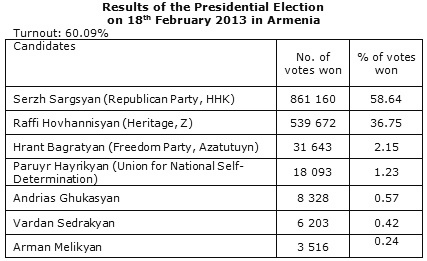Results
News
Corinne Deloy,
Fondation Robert Schuman,
Helen Levy
-

Available versions :
EN

Corinne Deloy
Fondation Robert Schuman
Helen Levy
Outgoing President Serzh Sargsyan (Republican Party HHK) was re-elected in the 1st round of the presidential election in Armenia on 18th February. He won 58.64% of the vote ahead of Raffi Hovhannisyan, leader of Heritage (Zharangutiun, Z), supported by the Socialist Labour Party (HASK) led by Moses Shahverdyan, winning 36.75% of the vote. The five other candidates each won less than 3% of the vote.
Turnout totalled 60.09%, i.e. -9,16 points less in comparison with the 1st round of the presidential election on 19th February 2008.
"I voted for the future of Armenia, for the security of our citizens," declared outgoing President Serzh Sargsyan. "It was the best election in independent Armenia's history. It shows that democratic processes are irreversible," stressed Edward Charmazanov, the spokesperson for the Head of State's party. The spokesperson for the main opposition candidate Raffi Hovhannisyan, Hovser Hourchoudyan denounced a "shameful election marred by a massive amount of fraud" and called on the Armenians to demonstrate on 19th February. "We received hundreds of messages about massive infringements to the electoral code such as ballot box stuffing, intimidation and vote purchasing, reads a press release distributed by those campaigning for the Heritage candidate. Raffi Hovhannisyan also refused to acknowledge the results and has said that he was the true winner of the election. "Serzh Sargsyan must be the first president of Armenia to acknowledge the victory of the people. Our people deserve an elected president de jure," he declared.
Former Prime Minister (1993-1996) Hrant Bagratyan (Freedom Party, Azatutuyn) denounced "massive infringements" and said that he was not ruling out "demonstrations after the vote." The Presidential election was supervised by 600 international observers.
The only events which interspersed the electoral campaign were the attempted assassination of Paruyr Hayrikyan on 31st January (Union for National Self-Determination), who was injured by a gunshot wound to the shoulder in the centre of Erevan, and the hunger strike by Andrias Ghukasyan, who wanted to achieve the invalidation of the candidature of the leader of the Republican Party (whom he accuses of massive fraud) and the boycott of the presidential election by the international observers. Former Foreign Minister of the Nagorno-Karabakh (2004-2005), Arman Melikyan, announced that he would not vote on 18th February deeming that the presidential election would be marred by fraud in support of the Head of State.
Many opposition personalities gave up the election race including Gagik Tsarukyan, leader of Prosperous Armenia (BHK), deemed to be the only potential rival to outgoing President Serzh Sargsyan. The Revolutionary Federation Dashnaktsutyun (HHD), led by Hrant Markaryan, and the Armenian National Congress refused to put a candidate forward and chose not to support any of the people running. Many saw in their withdrawal the consequences of an agreement between these parties with those in power rather than a real desire on their part to denounce an election that lacked transparency.
The campaign focused on economic issues, the population's main concern; 30% are unemployed (the official figure is 6%!) and one third (33%) live below the poverty line (set at 67.40€/month). Since the beginning of the 1990's, around 1 million Armenians (out of 3.2 million inhabitants) have left their country in quest of a better future.
In Armenia the average wage is 225€/month. The GDP growth totalled 7% in 2012. "On we go towards a wealth Armenia!" repeats Serzh Sargsyan, who chose these words as his slogan. The president promised his fellow countrymen that they would soon be prosperous.
Aged 58 Serzh Sargsyan, who originates from Stepanakert, the capital of Nagorno-Karabakh, is a graduate of the Faculty of Philology at the University of Erevan. Appointed Defence Minister in 1993, he then became Director of the National Security Council and National Security Minister two years later. In 2006 he succeeded Andranik Margaryan as Prime Minister after the decease of the latter; he won the presidential election on 19th February 2008, a post he has been re-elected to five years later.
On the same theme
To go further
Elections in Europe
Corinne Deloy
—
28 January 2025
Elections in Europe
Corinne Deloy
—
14 January 2025
Elections in Europe
Corinne Deloy
—
3 January 2025
Elections in Europe
Corinne Deloy
—
17 December 2024

The Letter
Schuman
European news of the week
Unique in its genre, with its 200,000 subscribers and its editions in 6 languages (French, English, German, Spanish, Polish and Ukrainian), it has brought to you, for 15 years, a summary of European news, more needed now than ever
Versions :



